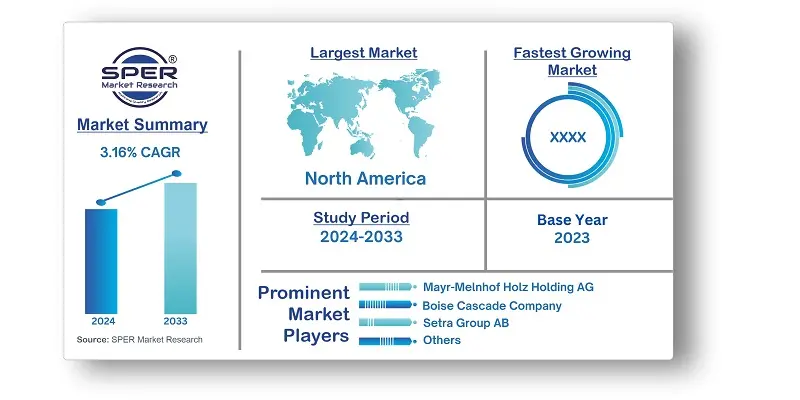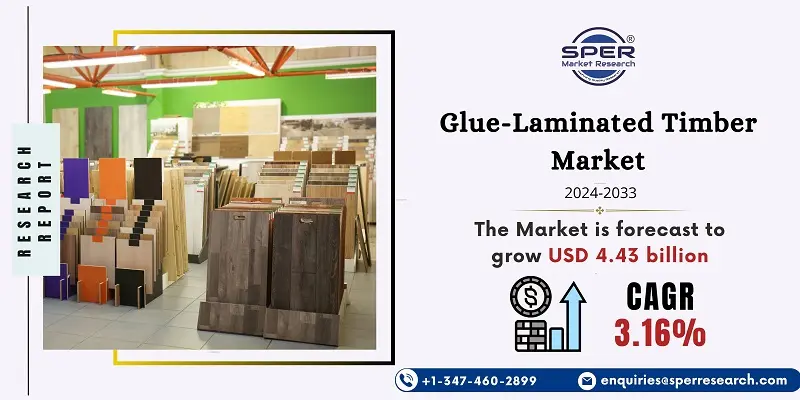
Glue-Laminated Timber Market Trends, Share, Size, Demand, Revenue and Future Outlook
Glue-Laminated Timber Market Growth, Size, Trends Analysis- By Product Type, By Glue Type, By Lamination Configuration, By Application- Regional Outlook, Competitive Strategies and Segment Forecast to 2033
| Published: Oct-2024 | Report ID: CHEM2495 | Pages: 1 - 245 | Formats*: |
| Category : Chemical & Materials | |||
- August 2023; The purchase of Brockway-Smith Company (BROSCO®), a well-known wholesale distributor with a focus on doors and millwork, was agreed upon by Boise Cascade Company.
- June 2023; At the Leoben sawmill site, Mayr-Melnhof Holz Holding AG opened the first cross-laminated timber facility in history, complete with an automated high-bay storage for sawn timber and an upstream re-sorting and planning plant. The plant was authorized by PEFC.


| Report Metric | Details |
| Market size available for years | 2020-2033 |
| Base year considered | 2023 |
| Forecast period | 2024-2033 |
| Segments covered | By Product, By Glue Type, By Lamination Configuration, By Application. |
| Regions covered | North America, Asia-Pacific, Latin America, Middle East & Africa, and Europe. |
| Companies Covered | EcoCurves BV, Forest Timber Engineering Ltd., Structural Wood Systems, Mayr-Melnhof Holz Holding AG, Boise Cascade Company, Setra Group AB, Pfeifer Holding GmbH, Confor Corporation, Calvert Company Inc, Sturcturlam. |
- Construction Companies and Contractors
- Architects and Designers
- Real Estate Developers
- Wood Product Manufacturers
- Government Bodies and Regulatory Agencies
- Investors and Venture Capitalists
- Distributors and Suppliers
| By Product Type: | |
| By Glue Type: | |
| By Lamination Configuration: | |
| By Application: |
- Global Glue-Laminated Timber Market Size (FY’2024-FY’2033)
- Overview of Global Glue-Laminated Timber Market
- Segmentation of Global Glue-Laminated Timber Market by Product Type (Straight Beams, Curved Beams, Arch Beams, Columns, Trusses, Others)
- Segmentation of Global Glue-Laminated Timber Market by Glue Type {(Phenol Formaldehyde (PF), Melamine Urea Formaldehyde (MUF), Polyurethane (PUR), Epoxy, Others)}
- Segmentation of Global Glue-Laminated Timber Market by Lamination Configuration (Horizontal Lamination, Vertical Lamination, Diagonal Lamination)
- Segmentation of Global Glue-Laminated Timber Market by Application (Residential Construction, Commercial Construction, Industrial Construction, Bridges and Infrastructure, Others)
- Statistical Snap of Global Glue-Laminated Timber Market
- Expansion Analysis of Global Glue-Laminated Timber Market
- Problems and Obstacles in Global Glue-Laminated Timber Market
- Competitive Landscape in the Global Glue-Laminated Timber Market
- Impact of COVID-19 and Demonetization on Global Glue-Laminated Timber Market
- Details on Current Investment in Global Glue-Laminated Timber Market
- Competitive Analysis of Global Glue-Laminated Timber Market
- Prominent Players in the Global Glue-Laminated Timber Market
- SWOT Analysis of Global Glue-Laminated Timber Market
- Global Glue-Laminated Timber Market Future Outlook and Projections (FY’2024-FY’2033)
- Recommendations from Analyst
1.1. Scope of the report1.2. Market segment analysis
2.1. Research data source
2.1.1. Secondary Data2.1.2. Primary Data2.1.3. SPERs internal database2.1.4. Premium insight from KOLs
2.2. Market size estimation
2.2.1. Top-down and Bottom-up approach
2.3. Data triangulation
4.1. Driver, Restraint, Opportunity and Challenges analysis
4.1.1. Drivers4.1.2. Restraints4.1.3. Opportunities4.1.4. Challenges
4.2. COVID-19 Impacts of the Global Glue-Laminated Timber Market.
5.1. SWOT Analysis
5.1.1. Strengths5.1.2. Weaknesses5.1.3. Opportunities5.1.4. Threats
5.2. PESTEL Analysis
5.2.1. Political Landscape5.2.2. Economic Landscape5.2.3. Social Landscape5.2.4. Technological Landscape5.2.5. Environmental Landscape5.2.6. Legal Landscape
5.3. PORTERs Five Forces
5.3.1. Bargaining power of suppliers5.3.2. Bargaining power of buyers5.3.3. Threat of Substitute5.3.4. Threat of new entrant5.3.5. Competitive rivalry
5.4. Heat Map Analysis
6.1. Global Glue-Laminated Timber Market Manufacturing Base Distribution, Sales Area, Product Type6.2. Mergers & Acquisitions, Partnerships, Product Launch, and Collaboration in Global Glue-Laminated Timber Market
7.1. Global Glue-Laminated Timber Market Size, Share and Forecast, By Product Type, 2020-20267.2. Global Glue-Laminated Timber Market Size, Share and Forecast, By Product Type, 2027-20337.3. Straight Beams7.4. Curved Beams7.5. Arch Beams7.6. Columns7.7. Trusses7.8. Others
8.1. Global Glue-Laminated Timber Market Size, Share and Forecast, By Glue Type, 2020-20268.2. Global Glue-Laminated Timber Market Size, Share and Forecast, By Glue Type, 2027-20338.3. Solo Phenol Formaldehyde (PF)8.4. Melamine Urea Formaldehyde (MUF)8.5. Polyurethane (PUR)8.6. Epoxy8.7. Others
9.1. Global Glue-Laminated Timber Market Size, Share and Forecast, By Lamination Configuration, 2020-20269.2. Global Glue-Laminated Timber Market Size, Share and Forecast, By Lamination Configuration, 2027-20339.3. Horizontal Lamination9.4. Vertical Lamination9.5. Diagonal Lamination
10.1. Global Glue-Laminated Timber Market Size, Share and Forecast, By Application, 2020-202610.2. Global Glue-Laminated Timber Market Size, Share and Forecast, By Application, 2027-203310.3. Residential Construction10.4. Commercial Construction10.5. Industrial Construction10.6. Bridges and Infrastructure10.7. Others
11.1. Global Glue-Laminated Timber Market Size and Market Share By Region (2020-2026)11.2. Global Glue-Laminated Timber Market Size and Market Share By Region (2027-2033)11.3. Asia-Pacific
11.3.1. Australia11.3.2. China11.3.3. India11.3.4. Japan11.3.5. South Korea11.3.6. Rest of Asia-Pacific
11.4. Europe
11.4.1. France11.4.2. Germany11.4.3. Italy11.4.4. Spain11.4.5. United Kingdom11.4.6. Rest of Europe
11.5. Middle East and Africa
11.5.1. Kingdom of Saudi Arabia11.5.2. United Arab Emirates11.5.3. Qatar11.5.4. South Africa11.5.5. Egypt11.5.6. Morocco11.5.7. Nigeria11.5.8. Rest of Middle-East and Africa
11.6. North America
11.6.1. Canada11.6.2. Mexico11.6.3. United States
11.7. Latin America
11.7.1. Argentina11.7.2. Brazil11.7.3. Rest of Latin America
12.1. EcoCurves BV
12.1.1. Company details12.1.2. Financial outlook12.1.3. Product summary12.1.4. Recent developments
12.2. Forest Timber Engineering Ltd
12.2.1. Company details12.2.2. Financial outlook12.2.3. Product summary12.2.4. Recent developments
12.3. Structural Wood Systems
12.3.1. Company details12.3.2. Financial outlook12.3.3. Product summary12.3.4. Recent developments
12.4. Mayr-Melnhof Holz Holding AG
12.4.1. Company details12.4.2. Financial outlook12.4.3. Product summary12.4.4. Recent developments
12.5. Boise Cascade Company
12.5.1. Company details12.5.2. Financial outlook12.5.3. Product summary12.5.4. Recent developments
12.6. Setra Group AB
12.6.1. Company details12.6.2. Financial outlook12.6.3. Product summary12.6.4. Recent developments
12.7. Pfeifer Holding GmbH
12.7.1. Company details12.7.2. Financial outlook12.7.3. Product summary12.7.4. Recent developments
12.8. Confor Corporation
12.8.1. Company details12.8.2. Financial outlook12.8.3. Product summary12.8.4. Recent developments
12.9. Calvert Company Inc
12.9.1. Company details12.9.2. Financial outlook12.9.3. Product summary12.9.4. Recent developments
12.10. Sturcturlam
12.10.1. Company details12.10.2. Financial outlook12.10.3. Product summary12.10.4. Recent developments
12.11. Others
SPER Market Research’s methodology uses great emphasis on primary research to ensure that the market intelligence insights are up to date, reliable and accurate. Primary interviews are done with players involved in each phase of a supply chain to analyze the market forecasting. The secondary research method is used to help you fully understand how the future markets and the spending patterns look likes.
The report is based on in-depth qualitative and quantitative analysis of the Product Market. The quantitative analysis involves the application of various projection and sampling techniques. The qualitative analysis involves primary interviews, surveys, and vendor briefings. The data gathered as a result of these processes are validated through experts opinion. Our research methodology entails an ideal mixture of primary and secondary initiatives.



Frequently Asked Questions About This Report
PLACE AN ORDER
Year End Discount
Sample Report
Pre-Purchase Inquiry
NEED CUSTOMIZATION?
Request CustomizationCALL OR EMAIL US
100% Secure Payment






Related Reports
Our Global Clients
Our data-driven insights have influenced the strategy of 200+ reputed companies across the globe.




















